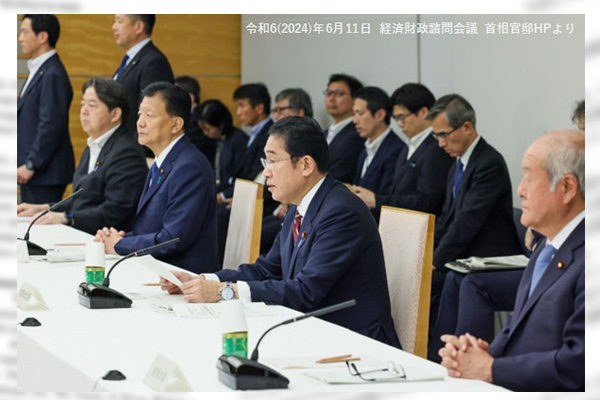On June 11, the government released a draft Basic Policy on Economic and Fiscal Management and Reform for 2024 that sets the direction of future economic and fiscal policies. The draft Basic Policy 2024 aims to ensure Japan’s breakaway from deflation by addressing various social challenges and to create a society in which the people can feel affluence. Particularly, an indicator for fiscal consolidation attracted attention. The government retained in the draft its target of achieving a primary balance surplus in the fiscal 2025. The primary balance, or PB, is the indicator that shows whether government spending other than government bond expenses is covered by tax and some other revenues. A surplus means that such government spending is fully covered by these revenues.
Certainly, it is desirable that the vitalization of economic activities will push up tax revenue to bring about a PB surplus. However, the surplus should be achieved as a result of economic growth. Even if expenditure cuts are made to achieve a surplus when the economy is stagnant, the surplus cannot be sustained. Economic growth should be a top priority. The target timing for achieving a PB surplus should be set flexibly according to actual economic conditions. It should not be set on a calendar basis, as is the case with the draft Basic Policy 2024.
The draft Basic Policy retains the target year for PB surplus
The annual Basic Policy has traditionally advocated “fiscal policy based on the economy” as a basic principle. However, it should clearly state that “fiscal consolidation through economic growth will be pursued.” The latest draft Basic Policy compiled a six-year “economic and fiscal new birth plan” covering fiscal 2025-2030 as a near-term fiscal consolidation plan, and retained fiscal 2025, in that framework, as the PB surplus target year as previously set.
With regard to the government’s “expenditure guidelines” that set de facto ceilings for each expenditure item and practically work as standards for budgetary assessment, the draft calls for continuing efforts to realize the expenditure guidelines for the new plan’s first three years (fiscal 2025-2027), following on from the previous three years. However, the draft says, “The specific details [of the efforts] will be considered through the budget formulation process, with economic and price trends being taken into account.”
While the government says the achievement of the PB surplus in fiscal 2025 has come into sight, whether the achievement will actually be realized depends on the size of a supplementary budget for the year. Interestingly, the draft notes that if the basic trend of a certain level of PB surplus is maintained between fiscal 2025 and 2027, fiscal sustainability can be secured. This is close to the idea that modest PB surplus can be maintained if the economy is stable after the achievement.
The flexibility clause as Abe’s legacy
The expenditure guidelines, while playing a great role in the budget formation process, are put into a footnote rather than the main text of the policy, disturbing a balance. On the other hand, the draft Basic Policy retains a clause that the expenditure guidelines or any other fiscal constraints should not narrow the range of important policy choices. This is a so-called flexibility clause to allow fiscal policy to respond flexibly to any major policy shift like a substantial increase in defense spending. The clause reflects the idea of the late former Prime Minister Shinzo Abe, who wanted to make the Basic Policy flexible enough to respond to various situations.
Etsuro Honda is a member of the Planning Committee of the Japan Institute for National Fundamentals and a former special adviser to the cabinet. He advised then Prime Minister Shinzo Abe for the success of Abenomics.


